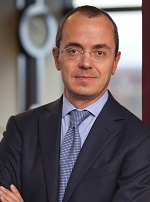Gilead ($GILD) and its controversially expensive Sovaldi (sofosbuvir) hepatitis C drug is set to gain a major new market, Japan, and its half-million people with the type the drug treats, though other major drugmakers are in, or eyeing, the same market.
 Japan's health ministry signed off on including the drug among those subsidized by the national health plan, but set its price at about $515 per daily dose.
Japan's health ministry signed off on including the drug among those subsidized by the national health plan, but set its price at about $515 per daily dose.
The regimen requires 12 weeks of doses, so the government would have to shell out more than $43,000 per patient, the patient with a copay of about $335 for the full regimen.
According to Barron's, Japan is said to have 29% of the world's hepatitis C patients, or 1.1 million, and counts 216,050 with genotype-2 hep C, the specific type treated by Sovaldi. If all of them opt for Sovaldi, that means sales to U.S.-based Gilead of more than $9 billion, according to Barron's math.
Nikkei uses different numbers, and says Japan has about 2 million people with the virus, and nearly a third of them have the gen-2 type treated by Sovaldi. That would put Gilead maximum sales in the 665,000 neighborhood. If 500,000 patients opt for the drug, Nikkei added, the cost of the drug would be nearly $17 billion.
The ministry sign-off was not the final action, however. A panel of experts has been called to meet next week to consider whether to endorse the ministry's decision.
 |
| BMS CEO Giovanni Caforio |
In Japan, Bristol-Myers Squibb ($BMY) was the first to market a next-gen hepatitis C treatment. The BMS combo--the NS5A inhibitor Daklinza (daclatasvir) and the NS3/4A protease inhibitor Sunvepra (asunaprevir)--has been on the market in Japan since last fall, though the company pulled the combination from consideration by the FDA.
"Regarding Hepatitis C, global sales were strong at $264 million, primarily driven by the performance of our Daklinza/Sunvepra combination regimen in Japan," Giovanni Caforio, chief operating officer and CEO-designate, said on the first quarter earnings call.
Francis Cuss, chief scientific officer, then gave a few more details about sales in Nippon.
"From the perspective HCV Japan let me say the performance has been really strong," Cuss said.
"Our dual regimen Sunvepra/Daklinza we launched in the middle of last year. When we describe the opportunity there remember there's about a 1.2 million patients with HCV, with hepatitis C, in Japan. Of that 70% are genotype IB. And we decided to focus initially on the approximately 150,000 patients that are in the healthcare system actively seeking treatment. We've seen a really strong commercial execution in Japan. We've seen rapid uptake, and as you've mentioned we had approximately $200 million in sales in Japan in the first quarter."
"When we look at our penetration in terms of our share of the more recent oral regimens, we of the vast majority of the patients there. The largest share we have is in the subset of 150 patients I described before, but we've seen some uptake with new patients coming into the treatment in Japan as well."
That may also be bittersweet news to AbbVie ($ABBV), which in February asked Japanese regulators to approve its antiviral cocktail, hoping to grab a piece of that market as it fights for share in the States.
AbbVie's application to the Japanese Ministry of Health, Labor and Welfare is based on a Phase III study dubbed GIFT-I, which focused on patients with genotype 1b chronic hepatitis C. The regimen tested was 12 weeks of a three-drug cocktail, including two direct-acting antivirals.
- read the stories from Nikkei and Barron's